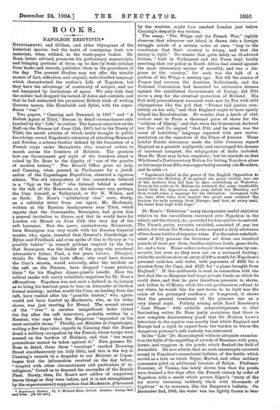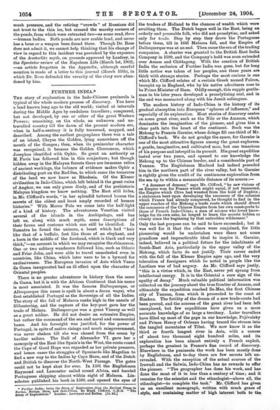BOOKS.
GUICCIARDINI and Gibbon, and other Olympians of the historical species, bad the habit of consigning their raw materials, when utilised, to the waste-paper basket. Dr. Rose, better advised, preserves his preliminary manuscripts, and bringing portions of them up to date by fresh cuttings from books and records, publishes them in the periodicals of the day. The present Studies may not offer the notable mosaic of fact, reflection, and original, well-chiselled language which characterised the author's Life of Napoleon, but they have the advantage of continuity of subject, and are not hampered by limitations of space. We only wish that the author had dropped his hatred of dates and contents, and that he had unlearned the persistent British trick of writing German names, like Humboldt and Sybel, with the super- fluous " von."
Two papers, " Canning and Denmark in 1807 " and " A British Agent at Tilsit," discuss in detail circumstances only touched by the " Life " in outline. The famous interview on the Raft on the Niemen (of June 25th, 1807) led to the Treaty of Tilsit, the secret articles of which, lately brought to public knowledge, reveal Napoleon's intention of attacking Denmark and Sweden, a scheme further defined by the formation of a French corps under Bernadotte, who received orders to march across the frontiers of Holstein. The question how our Government got sight of the breakers ahead is raised by Dr. Rose to the dignity of " one of the puzzles of modern history." The Record Office gives no help, and Canning, when pressed in Parliament for a justifi- cation of the Copenhagen Expedition, observed a rigorous silence. The old interpreters of this conundrum believed in a " Spy on the Raft" who listened behind a curtain to the talk of the Monarchs, or the informer was, perhaps, the Czar himself, or Talleyrand, or Sir R. Wilson, and so forth. Dr. Rose's "satisfactory clue" rests, firstly, on a rubbishy letter from our agent, Mr. Mackenzie, written at the Russian headquarters near Tilsit, which reports that the Commander, Bennigsen, had given him a general invitation to dinner, and that he would leave for London via Memel on June 25th (the very day of the raft business). Now the queer, cantankerous, Brunswick- born Bennigsen was very wroth with his Russian Imperial master, who, again, resented that General's blunderings at Eylau and Friedland, and even spoke of him to Savant as " a possible traitor" (a remark perhaps inspired by the fact that Bennigsen was the leader of the gang who murdered Alexander's father, Paul, a few years before). Therefore, thinks Dr. Rose, the irate officer, who must have known the Czar's secrets, would naturally, after the incident on the raft on the Niemen, have dropped " some precious hints " for his English dinner-guest's benefit. Here the critical reader will surely substitute negatives for Dr. Rose's affirmatives. Napoleon was not such a dullard in diplomacy as to bring his heaviest guns to bear on Alexander at the first formal meeting; neither would the Czar, on landing from the raft, have rushed after his "possible traitor," who, again, would not have hunted up Mackenzie, who, as his letter shows, was just starting for Memel. The second strand of the " clue " is another insignificant letter (dated the day after the raft interview), probably written by a Russian, who says that the Emperors "separated on the most amicable terms."' Thirdly, our Minister at Copenhagen, writing a few days later, reports to Canning that the Danes dread a military occupation by the French, whose troops were massed on the borders of Holstein, and that " too many precautions cannot be taken against it." Now, guesses Dr. Rose in detail, these three " warnings " reached Downing Street simultaneously (on July 16th), and this is the key to Canning's remark in a despatch to our Minister at Copen- hagen that the information received on the day before, "coupled' with other circumstances and particulars of in- telligence," forced us to demand the surrender of the Danish Fleet. Surely, then, Dr. Rose's new edifice of conjecture leaves things as they were before, and it is not strengthened by the supernumerary supposition that Mackenzie, if favoured
• Napoleonic Studios. By J. Holland Bose, Litt.D. Londm : George Bell sad Sone. [7e. 6d. net..]'
by the weather, might have reached London just before Canning's despatch was written.
The essay, "The Whigs and the French War," rightly observes that whenever our island is drawn into a foreign
struggle minds of a certain order at once " leap to the conclusion that their country is wrong, and that - the enemy is right." No wonder that quite lately an ill-advised faction, " both in Parliament and the Press, kept loudly asserting that our policy in South Africa, had sinned against
the most elementary axioms of morality, and was a dis- grace to the country," for such was the talk of a portion of the Whigs a century ago. Not till the armies of France had overrun the Austrian Netherlands, and the National Convention had launched its subversive decrees against the established Governments of Europe, did Pitt move a step for the eventual protection of Holland. His first mild precautionary measures were met by Fox with wild objurgations like the yell that " France had justice com- pletely on her side," and that England ought to have openly helped the Revolutionists. No wonder that a batch of club orators sent to Paris a thousand pairs of shoes for the " soldiers of liberty," and that when the Convention declared
war Fox and Co. argued " that Pitt, and he alone, was the cause of hostilities," language repeated with new instru- mentation on the signature of the Peace of Amiens.. These
baleful Foxite utterances made the little Corsican regard England as a guantite negligeable, and encouraged his dreams
of universal conquest, the subjugation of India included. Here Dr. Rose may be too emphatic ; but he reminds us that Whitbread's Parliamentary Motion for letting Napoleon alone on his escape from Elba was supported by seventy-one Members,
and he adds :-
"Napoleon's belief in the power of the English Opposition to overthrow the Ministry, if he gained one great victory, was one of the motives that led him to dare everything at Waterloo. Even in his exile at St. Helena he retained the same irradicable belief that the Opposition must soon defeat the Ministry, and then would come a message for his liberation. Gourgaud tells us, time after time, how eagerly the great man scanned the horizon for sails coming from Europe; and how, at every mail, his heart beat high with hope."
Dr. Rose's "Detention" essay incorporates useful statistics relative to the surveillance exercised over Napoleon in the island, and the dietary, &c., provided for him and his household. The French party, servants excluded, consisted of, say, ten adults, for whom Sir Hudson Lowe assigned a daily allowance of two dozen bottles of superior wines. For the entire establish- ment of fifty persons the Governor set down one hundred pounds of meat per diem, besides eighteen fowls, game-birds,
&c., and a ham. Home orders reduced these estimates by one- seventh, but even so they were not on a scrimped footing; while the archives show an entry of £40 a month for Napoleon's personal cash-box and toilet, with payments of £245 for a
phaeton from the Cape, and £122 for "a piano brought from England." If this arithmetic is read in connection with the fact that the ex-Emperor had large private funds on which he could draw, and that he gave therefrom presents to slaves, and bribes to O'Meara, while his own pertinacious refusal to say where he would like his new house to be built was the cause of his prolonged residence at Longwood, it shows that the general treatment of the prisoner was on a very liberal scale. Politely setting aside Lord Rosebery's " Last Phase " with suitable acknowledgments to that
fascinating writer, Dr. Rose justly maintains that there is now complete documentary proof that Sir Hudson Lowe's behaviour to the captive was exactly that which England and Europe had a right to expect from the warden to whom the
dangerous prisoner's safe custody was entrusted.
In the " Life" Dr. Rose adopted without adequate examina- tion the fable of the engulfing of crowds of Russians with guns, horses, and waggons in the ponds which flanked the field of Austerlitz. He now admits that no such catastrophe occurred except in Napoleon's sensational bulletin of the battle, which served as a text on which Segur, Marbot, and other military romancers piled up additional beauties of fiction. Professor Fournier, of Vienna, has lately shown him that the ponds were drained a few days after the French victory by order of
Napoleon, with a result which proves Segur's "story of the icy mirror becoming suddenly black with thousands of fugitives " to be nonsense, like the Emperor's bulletin. On December 2nde 1805, the water was too lightly frozen to bear much pressure, and the retiring " crowds " of Russians did not trust to the thin ice, but crossed the marshy corners of the ponds, from which were extracted two—as some read, three —human bodies. Both ponds are now arable land, and never has a bone or a weapon been found there. Though Dr. Rose does not admit it, we cannot help thinking that his change of view in regard to this incident was provoked by the exposure of the Austerlitz myth, on grounds approved by Lanfrey, in the Spectator review of the Napoleon Life (March 1st, 1902), —an article forgotten in the Appendix, although careful mention is made of a letter to this journal (larch 15th), in which Dr. Rose defended the veracity of the story now aban- doned by him.



































 Previous page
Previous page